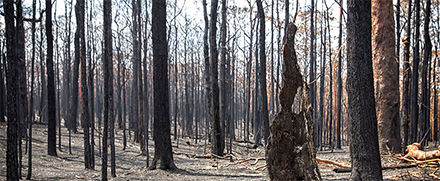An easing in residential construction and increased export uncertainty loom as major challenges for forestry and wood processors in the wake of summer’s bushfires and COVID-19, according to an ABARES Insights report released yesterday. Source: Timberbiz
The analysis of effects of bushfires and COVID-19 on the forestry and wood processing sectors has found that so far trade appears to have been relatively unaffected by either the bushfires or COVID-19.
However, ABARES’ acting Executive Director Peter Gooday said that many of the impacts may take several months or longer to flow through.
“While the duration of the economic impacts of COVID-19 are uncertain, the bushfires could have lasting effects on domestic log supply for decades to come,” Mr Gooday said.
“In the medium to long term, the age profile of softwood plantations, particularly in New South Wales, will change significantly as fire-affected areas are replanted.
“In the shorter term, the expected decline in residential dwelling commencements due to COVID-19 related restrictions has fuelled concerns that demand for sawnwood could decline significantly over the next six months.
“We know that several mills are reducing production and cutting staff, with demand for wood-based panels for interior use also likely to decline.”
Potential reductions in domestic demand for wood products are likely to be compounded by an increased supply of logs over the next 12 months, as forest growers salvage fire-affected trees.
At the national level, around 8.3 million hectares of native forests and 130,000 hectares of plantations fell within the extent of the fires. This accounts for about six per cent each of the total native forest area and the total plantation estate.
Mr Gooday said there remained some uncertainty regarding the damage caused by the fires and potential salvageable volumes.
“The extent to which fire affected trees can be harvested depends on the severity of the fires and the types of logs,” Mr Gooday said.
“For example, if they are not severely burnt, sawlogs may still be processed by domestic sawmills and pulplogs may still be chipped to produce packaging and industrial paper and paperboard products.
“With limited opportunities to sell additional logs in the domestic market, growers may look to export markets in the near future.”
Mr Gooday said that based on the latest statistics, trade has remained strong in recent months despite COVID-19 related restrictions.
“While values of forest and wood product exports in January and February were low compared to the previous five years, exports recovered in March and were still within the historic range,” Mr Gooday said.
“However, we may still see impacts on trade in the coming months as global demand for wood products falls and the effects of the bushfires on log supply are realised.”
Assistant Minister for Forestry Jonno Duniam said the Government would continue to address the challenges posed by the bushfires.
“We have been working hard with industry to identify targeted initiatives to assist them to get back onto their feet, to secure jobs and future-proof for generations to come,” Senator Duniam said.
“We understand the issues the forestry industry is facing and have taken action to support them, including committing $65 million in targeted support to assist the industry to rebuild.
“The Morrison Government’s new forestry initiatives include a $40 million Forestry Recovery Development Fund for grants of between $1 million and $5 million to deliver innovative new investments in facilities and technology. The Fund will secure and create jobs, especially in our regional communities that have been hardest hit by the bushfires,” he said.
“In addition to this, we have committed $15 million for Salvage Log Transport Assistance, provided through the $2 billion National Bushfire Recovery Fund, which will support transport of salvaged burnt logs to storage and processors.
“We have also announced $10 million for a Salvage Log Storage Fund to establish storage facilities for fire-affected salvage logs in Victoria, New South Wales and South Australia.
“The Morrison Government is supporting the forestry industry through the $680 million HomeBuilder scheme, which will boost residential construction and secure jobs right across the supply chain.”
Senator Duniam said that the Government was committed to rebuilding the forestry industry in the wake of the devastating bushfires.
This recovery would be informed by the House of Representatives Standing Committee on Agriculture and Water Resources inquiry into timber supply chain constraints in the Australian plantation sector and the ABARES spatial survey currently underway.
That survey of plantation growers is expected to provide a more accurate indication of the potential impacts of the bushfires on long-term log supply.
“The Morrison Government will continue to work with the forestry industry to deliver further assistance that not only secures access to critical forestry resources, but secures a long-term recovery of this important sector,” Senator Duniam said.
The report can be downloaded at ABARES Insights: Analysis of Effects of bushfire and COVID-19 on the forestry and wood processing sectors – PDF






